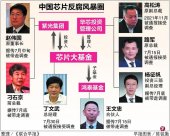A wave of rebound in the first set of Chinese stock markets is triggered whether global investors should be heated to do more China again.Previously, these investors were frustrated due to the strict supervision and rectification of the Chinese government.
The Wall Street Journal reports that according to Morningstar Direct data, the funds of more than 6 billion US dollars (the same, about 8.4 billion yuan) in the last month have flowed into 30 international common funds that focus on Chinese stocks.This is at least the highest level since 2021.This shows that investors are optimistic about the category of heavy assets.
The MSCI China Index once fell to the lowest point in March in March, and it has now recovered that some of them have lost land, but this year, as of Monday (July 11), it still fell 14%.The Nasdaq Golden Dragon China Index fell 16%this year.The index includes dozens of US deposit certificates (ADR) issued by Chinese companies listed in the United States.
Many large investors believe that the dark moment of the Chinese stock market has passed, but after 12 months of turmoil, almost no one is eager to enter the market again.According to the data prepared by the S & P Global Market, in these 12 months, the market value of Chinese companies has evaporated nearly $ 3 trillion.
Reporting pointed out that the economic weakness caused by the "dynamic clearing" prevention policy of the "dynamic clearance" of the Chinese government, and the intensification of geopolitical tensions, the Chinese government's unswerving "dynamic clearing zero".market.
Technology, consumption, energy, and many other Chinese stocks fall again on Monday and Tuesday (12th), which confirms this.Earlier, a regulatory agency imposed a fine with the small quota of Internet giants Alibaba and Tencent, and the number of new local crown diseases in China increased again.The stock of science and technology stocks fell 11%on Monday and Tuesday's stocks listed on Hong Kong.
The Wall Street Journal quoted the UBS China Global Financial Marketing Division, the landlord, said that investors still have multiple uncertain factors in their hearts, but market confidence has got rid of the trough.He said that any continuous recovery will depend on how the Chinese government implements policies to support the economy, how to implement the supervision of Internet companies, and how companies respond to and perform.
In the past few months, investors' attitudes towards the Chinese market have changed from extreme pessimism to fragile and speculative trading mentality.Since the beginning of this year, in the market lows, Chinese officials have made supportive remarks, which basically caused a sharp rebound, and then the stock market began to swing again.
Since July last year, it has always been a hot topic whether China has investable. Before that, the Chinese government announced that it was a few days after Didi listed.Surversion messages.In the same month, China officially banned profit -making courses for most school -age children. The entire teaching and training industry was basically extinguished, and educational stocks and other Chinese ADRs encountered large -scale selling.
The Wall Street Journal pointed out that some investors have been bitten by snakes for ten years.
Dan Niles, a senior fund manager of hedge fund Satori Fund, said: "What I don't want to do is to buy a company's stock, and then the company was completely strangled."
NILES said that since mid -May this year, he has re -added Chinese technology stocks to his investment portfolio, but he basically has not selected individual stocks.In order to decentralize the risk, he bought and sold the exchange trading fund (ETF), such as the China Golden King CSI China Internet Index ETF.Niles believes that the current valuation of Chinese technology companies is about half of similar American companies, and the valuation seems to be relatively cheap, but he is still worried that regulators may cause greater harm.
Niles said: "If you are not sure who the next goal of the regulatory authorities is, it is not clear how much the regulatory authority will increase the supervision. Buying ETFs can make you do not need to cope with the risk of specific company risks.Participate in the rise. "
CICC CSI CSI China Internet Index ETF attracted about 1.6 billion US dollars in May and June.Jonathan Krane, the founder and CEO of the asset management company Kim Rui Fund, said that many people believe that these stocks have been oversold.
According to Morning Star data, other funds with large capital inflows in June include Ishares MSCI China ETFs and German Garrine CSI 300 Index ETF.The latter invests in the top stock value of the Shanghai and Shenzhen markets.
Morning Star Investment Management (Asia) Co., Ltd., the director of Hong Kong, GERMAINE Share said that some investment portfolio managers began to see the opportunity to bottom out because the valuation of Chinese stocks has fallen a lot.
William Blair Investment Management's investment portistor Vivian Lin Thursston said that the agency has recently increased investment in Chinese technology stocks, and she believes that China's regulatory environment has stabilized.
Lin Thursston said that for regulations and policies, the Chinese government's way of acting is often implemented at the beginning, but once the results are seen, they will turn their attention elsewhere.
Lin Thursston added that she has remained optimistic about the long -term prospects of Internet companies in China. China's middle class has continued to expand. The domestic economy is accelerating the transformation of consumer -driven types and is promoting technological progress.
Others are still watching and seeing, and said that they need to see more evidence to prove that the supervisory wind direction is changing.
"I am a suspect", said Lawrence Brainard, chief emerging market economist TS Lombard."It is wrong to think that the idea of regulatory rectification has ended. It can be said that China is actually creating a framework. The technology industry is more like a public institutional company in this framework.The prospect of the industry. "
Brainard said that the biggest concern that has not been eliminated is that China is unwilling to give up the dynamic clearance policy, and says that the continuous control threat and frequent large -scale nucleic acid testing will continue to weaken consumer activitiesEssenceHe said that unless giving up dynamic clearance, the Chinese economy will continue to be full of uncertainty.
Similarly, Arthur Budaghyan, the chief emerging market strategist of BCA Research, headquartered in Montreal BCA Research, said that the recent rebound of Chinese technology stocks is only temporary, because the basic issues including delisting risk and supervision are stillexist.
He said: "If there is a rise in more than two to three months in the next two to three months, I will recommend selling it. Investors should have an additional risk premium with Chinese stocks."




